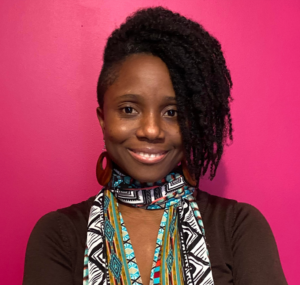While Kamille Gentles-Peart applauds the open education movement for expanding access to knowledge and including diverse student voices, she would like to see it do more to address systemic racism in academia.
Gentles-Peart, a professor of communication and media studies at Roger Williams University in Rhode Island, spoke about the issue at the 2022 Open Education Conference. (Video recording of her Oct. 20 talk is accessible here.)
“To be effective as a tool for racial justice, I believe that open education movements and practitioners need to do some introspection and make some changes,” Gentles-Peart said. “Being open doesn’t automatically mean you are anti-racist. It needs to be intentional.”
Gentles-Peart, who is originally from Jamaica, has a PhD in communication and a graduate certificate in gender studies from the University of Michigan, Ann Arbor. She is an interdisciplinary scholar whose research agenda looks at the ways in which anti-black racism is perpetuated through discourses and practices around Black women’s bodies and the wellness strategies Black women use to disrupt these racist and colonialist ideas.
As a professor, author and advocate, she is committed to fostering equitable environments for Black people and other people of color in the academy.
Gentles-Peart said she wants to create spaces that affirm the experiences of those who have been made invisible in society because of their race, and encourage racially dominant people to reflect on their own dominant racial positionalities.
“I deeply believe that the mission of higher education is not only to disseminate ‘the material,’ but to equip and inspire students to question and transform racial hierarchies, to cultivate their potential to be agents of racial justice,” Gentles-Peart said.
In her remarks at the October online event, Gentles-Peart said the progress in open education demonstrates it can provide “very fertile ground for dismantling racial oppressions in higher education.” However, to achieve such a goal, she challenged practitioners to become informed and be deliberate in their actions.
Gentles-Peart offered four suggestions for how open practices can be effectively mobilized for racial justice.
Open education needs to be practiced with an understanding of racial power and “education violence.” Marginalized communities, particularly Black people, have been harmed at an interpersonal, cultural and institutional level in higher education, Gentles-Peart said, citing the research of Jalili Mustafa. Many colleges and universities were made possible because of land theft and the slave system. These institutions continue to support policies that hurt Black and indigenous people and promote curriculum that explicitly excludes the voices of people of color.
It’s important, she said, to provide professional development in open practices that are framed in the realities of education violence and acknowledges this historical framework.
“It cannot be conceptualized and practiced in a vacuum,” she said of OER. “It has to be a part of a larger movement for institutional transformation, an ideological shift in education.”
Open education has to be driven by reparative justice. While many institutions have channeled their response into diversity, equity and inclusion efforts, Gentles-Peart said this approach has often failed at achieving equity or uplifting Black, indigenous and people of color. It tends to privilege the preferences and outcomes of white people, while neglecting the actual needs of marginalized communities.
Instead, Gentles-Peart suggests a reparative justice framework that actively seeks to make amends for damages caused by education violence.
“This means that it is explicitly driven by the experiences of the marginalized groups, not the dominantly positioned groups,” she said. “It prioritizes their healing, mental health, sovereignty, and restoration.”
Open education platforms tend to operate more through an equality lens rather than explicitly centering scholars who have been ostracized and inviting them to publish, Gentles-Peart said. When classes and open practices are designed with traditionally oppressed people in mind, teaching improves and everybody benefits, she added.
Open education has to be decolonized. Indigenous scholars around the world conceptualize decolonization as dismantling dominant white world orientations. Gentles-Peart said decolonization should be applied to course content—including OER.
“This process has to begin with an honest interrogation of whiteness and Eurocentric white supremacy in how open education is conceived and practiced,” she said. “We have to undo the normalization of whiteness in the open education world.”
Also, Gentles-Peart suggested open education practitioners need to intentionally include people of color — and that inclusion needs to be voluntary, purposeful, and equitable.
Open education has to be practiced with love. Gentles-Peart encouraged a rejection of all colonial worldviews and a radical love for Black, indigenous and other people of color and a desire to see them thrive.
“It cannot be taught. It has to be cultivated,” she said. “It requires introspection and honesty. It cannot be easily measured in a conventional assessment tool—but this point of love is an important point.”
Gentles-Peart concluded her talk with a quote from author Robin Kelley in his book, Freedom Dreams (2002): “Love and imagination may be the most revolutionary impulses available to us. And yet we have failed to understand their political importance and respect them as powerful social forces. . . The catalyst for political engagement has never been misery, poverty or oppression. People are drawn to social movement because of hope”
She added: “Open education practices are most effective to pursue racial justice when they are conceived and conceptualized in this kind of radical love with a little imagination, and a little dreaming.”
#
